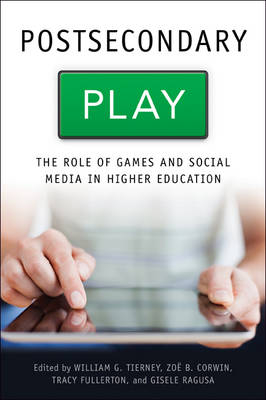
Postsecondary Play
Johns Hopkins University Press (Verlag)
978-1-4214-2275-6 (ISBN)
The college application process-which entails multiple forms, essays, test scores, and deadlines-can be intimidating. For students without substantial school and family support, the complexity of this process can become a barrier to access. William G. Tierney, Tracy Fullerton, and their teams at the University of Southern California approach this challenge innovatively. Using the tools of online games and social media, they have developed ways to make applying for college much less intimidating. While the vast majority of college students use social media and gaming in their everyday lives, colleges and universities have been slow to recognize and harness the power of either. Postsecondary Play explores the significance of games and social media in higher education, and particularly how they can be used to attract, retain, educate, and socialize students. Tierney, a past president of the American Educational Research Association, has gathered some of the best research on the emerging role of games and social media in the classroom and how these tools can boost student confidence and increase college access.
Scholars writing from a wide variety of disciplines-college access, social media, game studies, and learning sciences-provide concrete examples to illustrate the new and complex ways in which students learn in response to social media and games. Tierney and the contributors find that, although games can be powerful tools for encouraging underserved students, quality game design and mastering the concept of play-the ability to develop skills while engaging in the game-are essential in the effective use of serious games in teaching and learning. Summarizing a decade of research in game design and learning, Postsecondary Play will appeal to higher education scholars and students of learning, online gaming, education, and the media.
William G. Tierney is the Wilbur-Kieffer Professor of Higher Education and co-director of the Pullias Center for Higher Education at the University of Southern California. Zoe B. Corwin is an associate professor of research at the Pullias Center. Tracy Fullerton is the director of the Game Innovation Lab at USC. Gisele Ragusa is the director of USC's STEM Consortium.
Acknowledgments
Introduction. Why Games and Social Media?
Part I: What Is the Current Landscape of Higher Education?
Chapter 1. The Disruptive Future of Higher Education
Chapter 2. The Need to Increase College Enrollment and Completion
Chapter 3. Transition Readiness: Making the Shift from High School to College in a Social Media World
Chapter 4. From Communication to Community: How Games and Social Media Affect Postsecondary Stakeholders
Part II: What's in a Game?
Chapter 5. What Games Do Well: Mastering Concepts in Play
Chapter 6. The Open Laptop Exam: Reflections and Speculations
Chapter 7. Games, Passion, and "Higher" Education
Chapter 8. Game-Like Learning: Leveraging the Qualities of Game Design and Play
Part III: What Do We Know about Games and What Do We Need to Learn?
Chapter 9. Assessing Learning in Video Games
Chapter 10. Implications and Applications of Sociable Gaming for Higher Education
Chapter 11. Gender, Social Media, Games, and the College Landscape
Chapter 12. How Much Technology Is Enough?
Conclusion. The Shape of Things to Come
Glossary
Contributors
Index
| Erscheinungsdatum | 05.05.2017 |
|---|---|
| Reihe/Serie | Tech.edu: A Hopkins Series on Education and Technology |
| Zusatzinfo | 6 Line drawings, black and white; 6 Halftones, black and white |
| Verlagsort | Baltimore, MD |
| Sprache | englisch |
| Maße | 152 x 229 mm |
| Gewicht | 567 g |
| Themenwelt | Schulbuch / Wörterbuch ► Unterrichtsvorbereitung ► Unterrichts-Handreichungen |
| Informatik ► Weitere Themen ► Computerspiele | |
| Sozialwissenschaften ► Pädagogik ► Erwachsenenbildung | |
| ISBN-10 | 1-4214-2275-1 / 1421422751 |
| ISBN-13 | 978-1-4214-2275-6 / 9781421422756 |
| Zustand | Neuware |
| Haben Sie eine Frage zum Produkt? |
aus dem Bereich


